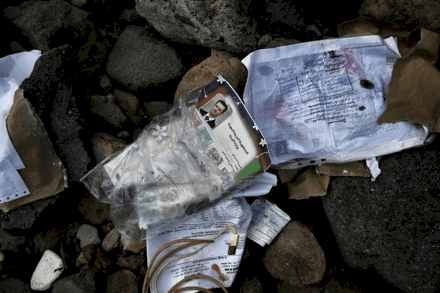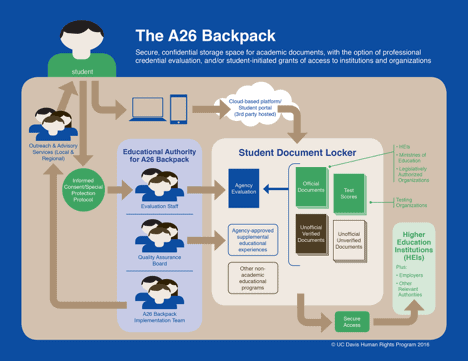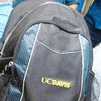July 6th, 2018

We wish to thank Professor Keith David Watenpaugh, Director of Human Rights studies at the University of California, Davis, for granting permission to share this post originally posted by Julia Ann Easley on June 12, 2018 in UC Davis’s Society, Arts & Culture News. Where necessary, ACEI has refreshed the post to include updates and new developments.
Jihad Qusanyeh, imprisoned and tortured as a student, will be among the first Syrian refugees to assemble a virtual “backpack” in a new project to help them reclaim their right to education. Article 26 Backpack, which uses face-to-face counseling and cloud-based technology to help refugees document and share their educational accomplishments, was launched in Lebanon beginning Friday, June 15.
The international consortium behind the project is led by Keith David Watenpaugh, a professor and director of Human Rights Studies at the University of California, Davis. Consortium members include the American Association of Collegiate Registrars and Admissions Officers, or AACRAO, and the Issam Fares Institute for Public Policy and International Affairs at the American University of Beirut, or AUB.

Jihad Qusanyeh – Qusanyeh, a fourth-year student of applied chemistry at the University of Damascus when he was taken prisoner for five years, wants to complete his studies. “I always aim to learn more and more for when I return to Syria,” he shared in a video recorded to include in his backpack. “I’ll use what I learn for rebuilding Syria.”
Help to overcome challenges
About 36 percent of global youth have access to higher education but only about 1 percent of eligible refugees do, according to the United Nations High Commission for Refugees. The ongoing Syrian civil war has internally displaced or made refugees of more than 12 million people, and hundreds of thousands among them were — or should have been — in university, Watenpaugh said.
Article 26 Backpack, a part of Global Affairs at UC Davis and supported by a $500,000 grant from the Ford Foundation, is named for the article that established the right to education in the Universal Declaration of Human Rights, nearly 70 years ago.
Watenpaugh said the tool will help refugees overcome significant impediments to re-entering academic life or applying for employment — from problems accessing their own documents to little clarity about the transferability of their credentials.

Source credit: UC Davis

More About the Technology Behind the Backpack – “A lot of what we do is important, but this was another level of helping our fellow human,” said Shawn DeArmond, who supervised the UC Davis web development group.“
Watenpaugh envisions broader implementation of Article 26 Backpack throughout the Middle East, particularly in the areas most affected by the war in Syria, and beyond. Moreover, he sees the Backpack’s potential to help not only refugees of war or those fleeing civil conflict, but also students with Deferred Action for Childhood Arrivals, or DACA, status in the United States and climate refugees.
The Lebanon launch
The first stage of the implementation was from June 15 through July 3. Watenpaugh and a team — including AUB students and faculty and AACRAO staff — visited refugee camps in the Bekaa Valley and hosted refugees elsewhere to help about 300 create backpacks.
A comic book will help introduce the Backpack to refugees. Trained students will help refugees set up backpacks at article26backpack.ucdavis.edu and upload documents including images of diplomas, transcripts and resumes. Backpackers have the option to record a video to serve as an oral statement of purpose. They control what they put in the backpack and with whom they share it.
Video Journals
Professor Watenpaugh has documented his recent Backpack Journey reflections in Lebanon through a number of videos. In this video, he asks: “What role can education play in the face of discrimination and prejudice? How can Article 26 Backpack as a humanitarian tool address this challenge?” For more, click here.
Future work
After nearly a month in Lebanon leading the initial implementation of Backpack, Watenpaugh returns to UC Davis Global Affairs to oversee the development of the next phase of this project. Work this summer will create an Arabic-language version of the tool, and in the early fall the project will be back in Lebanon to help more refugees set up backpacks.
In the future, Article 26 Backpack will integrate credential evaluation, academic counseling and job placement assistance through a feature called Compass. AACRAO, the higher education association, is building a cloud-based pool of international credential evaluators to assist refugee students and, in some cases, reconstruct academic histories that have been lost due to war.
A historian of the modern Middle East, Watenpaugh has seen up close the need for Article 26 Backpack. He has led a multidisciplinary research team that produced several major studies on Syrian students and scholars who are refugees in Jordan, Lebanon, Greece and Turkey. His most recent book is the award-winning Bread from Stones: The Middle East and the Making of Modern Humanitarianism.
To stay abreast of the Article 26 Backpack project, please follow Professor Watenpaugh on Facebook and LinkedIn.
Media contact(s)
Keith David Watenpaugh, Article 26 Backpack, +1 530-574-0815 cell (speaks English and Arabic), [email protected]
Mona Finucane, Article 26 Backpack, cell +1 707-673-7043 (speaks English and Arabic), [email protected]
Annetta Stroud, American Association of Collegiate Registrars and Admissions Officers, [email protected]
Hana Addam El-Ghali, Issam Fares Institute for Public Policy and International Affairs, AUB, +961 71037300, [email protected]
Julia Ann Easley, UC Davis News and Media Relations, 530-752-8248, cell 530-219-4545, [email protected]
Media Resources
• Press kit with photos and more
• Video: Jihad Qusanyeh shares his story (3 min, 44 secs)
• Comic Book Explains Project With Refugee’s Story
• More About the Technology Behind the Backpack
• Article 26 Backpack

The Academic Credentials Evaluation Institute, Inc. (ACEI), was founded in 1994 and is based in Los Angeles, CA, USA. ACEI provides a number of services that include evaluations of international academic credentials for U.S. educational equivalence, translation, verification, and professional training programs. ACEI is a Charter and Endorsed Member of the Association of International Credential Evaluators. For more information, visit acei-global.org.
